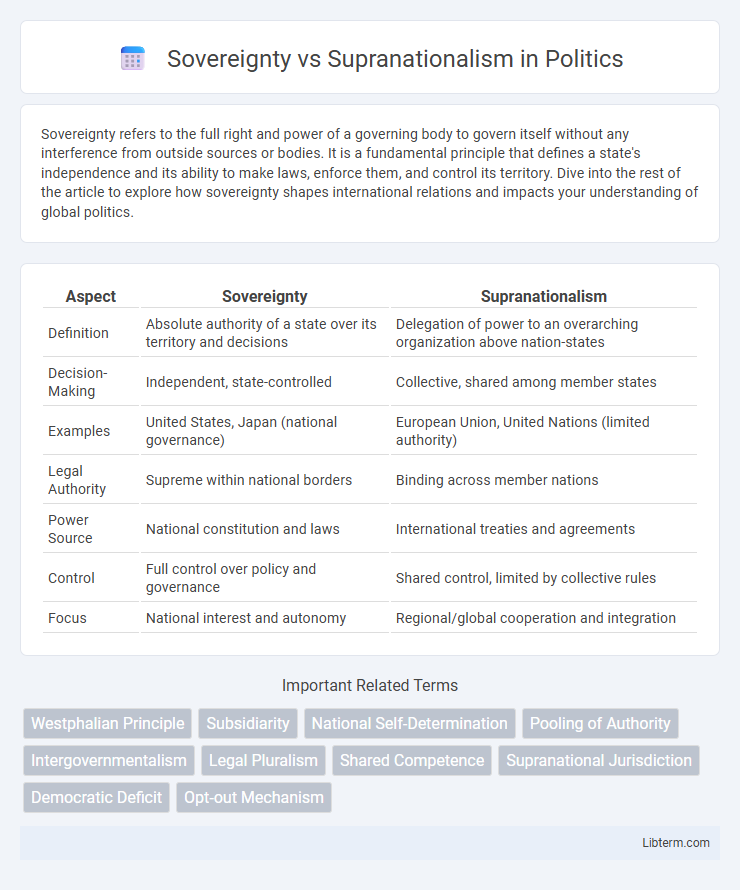Sovereignty refers to the full right and power of a governing body to govern itself without any interference from outside sources or bodies. It is a fundamental principle that defines a state's independence and its ability to make laws, enforce them, and control its territory. Dive into the rest of the article to explore how sovereignty shapes international relations and impacts your understanding of global politics.
Table of Comparison
| Aspect | Sovereignty | Supranationalism |
|---|---|---|
| Definition | Absolute authority of a state over its territory and decisions | Delegation of power to an overarching organization above nation-states |
| Decision-Making | Independent, state-controlled | Collective, shared among member states |
| Examples | United States, Japan (national governance) | European Union, United Nations (limited authority) |
| Legal Authority | Supreme within national borders | Binding across member nations |
| Power Source | National constitution and laws | International treaties and agreements |
| Control | Full control over policy and governance | Shared control, limited by collective rules |
| Focus | National interest and autonomy | Regional/global cooperation and integration |
Introduction to Sovereignty and Supranationalism
Sovereignty refers to the supreme authority of a state to govern itself without external interference, embodying full control over its domestic and foreign policies. Supranationalism involves the transfer of decision-making powers from individual states to an overarching authority, often seen in entities like the European Union, where member states share sovereignty for common goals. The tension between maintaining national sovereignty and embracing supranational cooperation shapes contemporary political and legal frameworks in international relations.
Defining State Sovereignty
State sovereignty refers to the absolute authority a state exercises over its territory, population, and governance without external interference, embodying the principle of political independence. It entails the power to enact laws, enforce policies, and conduct foreign relations autonomously, ensuring national self-determination. This concept fundamentally contrasts with supranationalism, where multiple states delegate authority to an overarching institution, potentially limiting individual sovereignties for collective decision-making.
The Concept of Supranationalism
Supranationalism refers to the process where multiple countries delegate authority to an overarching organization, enabling collective decision-making beyond individual national sovereignty. This concept is key in entities like the European Union, where member states share competencies in trade, security, and legislation to achieve common goals. Supranational institutions hold binding power that can supersede national laws to foster regional integration and cooperation.
Historical Evolution of Sovereignty
The historical evolution of sovereignty traces back to the Peace of Westphalia in 1648, which established the principle of state sovereignty and non-interference in domestic affairs. Over centuries, sovereignty evolved from absolute monarchies to modern nation-states, emphasizing territorial integrity and legal authority. The rise of supranational organizations like the European Union challenges traditional sovereignty by promoting shared governance and pooled decision-making among member states.
Rise of Supranational Organizations
The rise of supranational organizations such as the European Union (EU), United Nations (UN), and World Trade Organization (WTO) challenges traditional notions of state sovereignty by promoting shared authority and decision-making across member states. These organizations facilitate cooperation on global issues like trade, security, and environmental policies, reducing the unilateral power of individual nations. The evolution of supranational institutions reflects a shift towards collective governance aimed at addressing complex transnational challenges that surpass the capacity of single sovereign states.
Challenges to National Sovereignty
Challenges to national sovereignty arise from supranational entities imposing regulations that override domestic laws, limiting a nation's autonomous decision-making power. Member states face difficulties balancing compliance with international agreements and preserving control over economic, legal, and security policies. Erosion of sovereignty often sparks domestic political debates about the legitimacy and limits of transferring authority to supranational organizations like the European Union or United Nations.
Benefits and Drawbacks of Supranationalism
Supranationalism allows member states to pool sovereignty, enabling collective decision-making that can enhance economic integration, security cooperation, and global influence, as seen in entities like the European Union. This approach facilitates standardized regulations and reduces trade barriers, promoting efficiency and stability within regions. However, supranationalism may dilute national autonomy, create democratic deficits by shifting power to unelected bodies, and generate conflicts when member states' interests diverge.
Case Studies: European Union and United Nations
The European Union exemplifies supranationalism by enabling member states to cede aspects of sovereignty for collective decision-making in areas such as trade, monetary policy, and human rights enforcement, enhancing regional integration and policy coherence. In contrast, the United Nations operates primarily on intergovernmental principles where member states retain full sovereignty but cooperate on global issues like peacekeeping, security, and international law through consensus-driven resolutions. Case studies reveal that the EU's supranational governance structures facilitate binding legal frameworks and economic policies, whereas the UN's sovereignty-respecting model emphasizes diplomatic negotiation and voluntary compliance among nations.
The Future Balance: Sovereignty vs Supranational Governance
The future balance between sovereignty and supranational governance hinges on the evolving dynamics of global interdependence and national autonomy. Increasing challenges such as climate change, cybersecurity, and transnational trade demand stronger supranational institutions, yet the rise of nationalist movements emphasizes the protection of state sovereignty. Effective governance models will likely integrate layered authority, enabling cooperation on global issues while preserving core aspects of national decision-making.
Conclusion: Navigating the Sovereignty-Supranationalism Debate
Navigating the sovereignty-supranationalism debate requires balancing state autonomy with the benefits of collective decision-making and shared governance. Emphasizing flexible cooperation allows nations to retain core sovereignty while engaging in supranational institutions that address cross-border challenges like trade, security, and environmental policy. Effective frameworks prioritize mutual respect and adaptability, ensuring that integration does not undermine national interests but enhances regional stability and global influence.
Sovereignty Infographic

 libterm.com
libterm.com